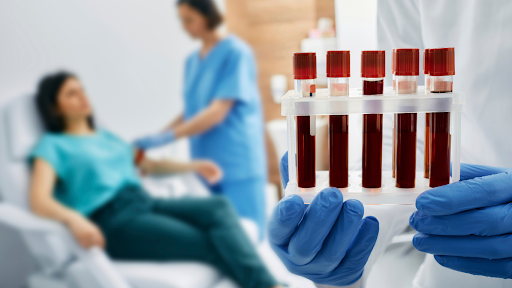When you find yourself in need of medical attention, the options can often feel overwhelming. Urgent care centers have become increasingly popular for their convenience and accessibility. One common question that arises is whether these facilities can perform blood work. Understanding the capabilities of urgent care can help you make informed decisions about your health.
 What is Urgent Care?
What is Urgent Care?
Urgent care centers are designed to provide immediate care for non-life-threatening conditions. They serve as an alternative to emergency rooms, offering a more efficient and cost-effective solution for patients who need prompt attention. These facilities are typically open extended hours and do not require appointments, making them an attractive option for many. In addition to their convenient hours, urgent care centers often have shorter wait times compared to traditional emergency departments, allowing patients to receive care more quickly and get back to their daily activities.
Services Offered at Urgent Care
Urgent care centers can handle a wide variety of medical issues, including minor injuries, infections, and illnesses. Common services include:
Treatment for sprains and fractures
Management of respiratory infections
Skin conditions and rashes
Minor lacerations and wounds
Vaccinations and preventive care
While urgent care centers are equipped to handle many health concerns, patients often wonder if they can also get blood work done during their visit. Many urgent care facilities are equipped with on-site laboratories, allowing them to perform a variety of diagnostic tests, including blood tests, urinalysis, and rapid tests for conditions like strep throat or influenza. This capability not only speeds up the diagnosis process but also enables healthcare providers to make informed decisions about treatment during the same visit.
In addition to diagnostic testing, urgent care centers frequently offer a range of other services that can be particularly beneficial for families. For instance, they often provide school and sports physicals, which are essential for children participating in extracurricular activities. Furthermore, many urgent care facilities have the ability to perform X-rays, which can be crucial in assessing fractures or other injuries. This comprehensive approach to urgent care ensures that patients receive thorough evaluations and appropriate treatment without the need for multiple trips to different healthcare providers.
Blood Work at Urgent Care
The short answer is yes; many urgent care facilities do offer blood work services. However, the extent of these services can vary significantly from one center to another. Some urgent care centers are equipped with in-house laboratories, allowing them to perform a variety of blood tests on-site, while others may need to send samples to an external lab. This flexibility means that patients can often receive timely care without the long wait times associated with traditional hospital settings.
Types of Blood Tests Performed
Urgent care centers can perform several types of blood tests, including:
These tests can provide valuable information regarding a patient's health status and help guide treatment decisions. For instance, a CBC can help identify infections or anemia, while a BMP can provide insights into kidney function and electrolyte balance. Additionally, rapid strep tests can help diagnose throat infections quickly, ensuring that patients receive appropriate antibiotics without delay. Blood glucose tests are particularly crucial for individuals with diabetes, as they can help monitor blood sugar levels and prevent potential complications.
Benefits of Getting Blood Work at Urgent Care
There are several advantages to getting blood work done at an urgent care center:
Convenience: With extended hours and no appointment necessary, patients can get tested when it fits their schedule.
Quick Results: Many urgent care facilities can provide same-day results, allowing for prompt diagnosis and treatment.
Cost-Effective: Urgent care visits are often less expensive than those at emergency rooms, making it a financially viable option for many.
Moreover, urgent care centers often have a more relaxed atmosphere compared to hospitals, which can help ease the anxiety that some patients may feel when undergoing medical tests. The staff at these facilities are typically trained to handle a wide range of medical issues, ensuring that patients receive comprehensive care tailored to their specific needs. This holistic approach not only addresses immediate health concerns but also encourages patients to take proactive steps towards maintaining their overall well-being.
Furthermore, many urgent care centers are now integrating advanced technology into their blood testing processes. This includes the use of electronic health records (EHR) systems that streamline patient information and test results, making it easier for healthcare providers to track a patient's history and make informed decisions. As a result, patients can expect a more coordinated and efficient care experience, which is especially beneficial for those with chronic conditions requiring regular monitoring.
When to Visit Urgent Care for Blood Work
Knowing when to visit an urgent care center for blood work can save time and ensure that you receive the appropriate care. Common scenarios include:
Acute Illness Symptoms
If experiencing symptoms like fever, fatigue, or unexplained pain, it may be wise to visit urgent care. Blood tests can help identify underlying issues, such as infections or other health concerns. For instance, a high white blood cell count might indicate an infection, while abnormal liver enzymes could suggest liver issues. In urgent care settings, healthcare professionals can quickly evaluate your symptoms and determine if blood work is necessary, allowing for timely diagnosis and treatment.
Follow-Up for Chronic Conditions
For individuals with chronic conditions, such as diabetes or hypertension, regular blood work may be necessary to monitor health status. Urgent care can provide these tests, especially if a primary care physician is unavailable. This can be particularly beneficial during times when patients may have difficulty scheduling appointments with their primary care providers. Additionally, urgent care facilities often have the capability to provide immediate results for certain tests, enabling patients to make informed decisions about their health without unnecessary delays.
Pre-Employment or School Requirements
Some employers and educational institutions require specific blood tests as part of their onboarding or enrollment processes. Urgent care centers can often accommodate these requests efficiently. They frequently offer a range of tests, including those for communicable diseases or immunization titers, which can be crucial for compliance with health regulations. Moreover, the convenience of urgent care centers, often with extended hours and walk-in availability, makes them an ideal choice for individuals needing to fulfill these requirements quickly, especially when deadlines are approaching.
Travel Preparations
In addition to employment and school requirements, travelers may need certain blood tests before embarking on international trips. Vaccination records and tests for diseases endemic to specific regions can be critical for ensuring safe travel. Urgent care centers are well-equipped to provide necessary vaccinations and blood tests, helping travelers meet health regulations and minimize the risk of illness while abroad. This service can be particularly valuable for last-minute travelers who may not have the time to visit their primary care physician for these essential health checks.
Monitoring Medication Effects
Patients on certain medications, such as anticoagulants or those undergoing treatment for chronic illnesses, may require regular blood tests to monitor the effects of their treatment. Urgent care facilities can facilitate these tests, allowing patients to receive timely adjustments to their medication if necessary. This proactive approach helps in managing potential side effects or complications, ensuring that patients maintain their health while adhering to their treatment plans. With the ability to quickly assess blood levels and provide feedback, urgent care centers play a crucial role in the ongoing management of medication therapies.
 Limitations of Blood Work at Urgent Care
Limitations of Blood Work at Urgent Care
While urgent care centers offer many benefits, there are limitations to consider. Not all urgent care facilities have the same capabilities, and some complex tests may not be available on-site.
Complex Testing Needs
For more specialized blood tests, such as those for autoimmune diseases or specific hormone levels, patients may need to visit a hospital or specialized laboratory. Urgent care is best suited for routine and common tests.
Potential Delays in Results
In cases where samples must be sent to an external lab, there may be delays in receiving results. This can be a critical factor for patients needing immediate answers.
Alternatives to Urgent Care for Blood Work
If urgent care is not the right fit for your blood work needs, there are other options available. Understanding these alternatives can help you choose the best path for your healthcare.
Primary Care Physicians
Your primary care physician (PCP) is often the best place to start for blood work. They can provide comprehensive evaluations and order tests based on your medical history and symptoms. Additionally, they can interpret results in the context of your overall health.
Laboratory Services
Many standalone laboratories specialize in blood testing. These facilities often offer a wide range of tests and may provide quicker results than urgent care centers that send samples out. Patients can often choose which tests they want, sometimes without a doctor's order.
Telehealth Options
With the rise of telehealth services, patients can consult with healthcare professionals online and receive guidance on necessary blood tests. Platforms like Doctronic.ai allow users to connect with medical experts who can recommend appropriate testing and direct them to local facilities that offer blood work.
Preparing for Blood Work
Preparation can play a crucial role in the accuracy of blood tests. Here are some tips to ensure your blood work goes smoothly:
Fasting Requirements
Some blood tests require fasting for a certain period before the test. For example, fasting blood glucose tests typically require fasting for at least 8 hours. Always check with the healthcare provider about specific instructions prior to your visit.
Medications and Supplements
Patients should inform their healthcare provider about any medications or supplements they are taking, as these can affect test results. In some cases, it may be necessary to adjust or temporarily stop certain medications before testing.
Hydration
Staying well-hydrated can make it easier for healthcare providers to draw blood. Drinking water before the appointment is generally encouraged, unless instructed otherwise.
Understanding Your Blood Test Results
Once the blood work is completed, understanding the results is crucial for managing your health. Blood test results can be complex, and it's essential to discuss them with a healthcare professional.
Normal Ranges
Each blood test has a normal range, which varies based on factors such as age, sex, and overall health. Results falling outside these ranges may indicate a need for further evaluation or treatment.
Follow-Up Actions
Depending on the results, follow-up actions may include additional testing, lifestyle changes, or medication adjustments. It's important to have a clear plan in place with your healthcare provider to address any concerns that arise from your blood work.
Experience the Future of Healthcare with Doctronic
Urgent care centers can be a valuable resource for patients needing blood work, offering convenience and quick results for many common tests. However, understanding the limitations and alternatives is essential for making informed healthcare decisions. Whether visiting an urgent care facility, your primary care physician, or utilizing telehealth services like Doctronic.ai, being proactive about your health is key. Always consult with healthcare professionals to ensure you receive the best care tailored to your needs.
In summary, urgent care can provide essential blood work services, but it's essential to know when to utilize them and when to seek other options. By being informed, patients can navigate their healthcare journey more effectively and ensure they receive the best possible care.
While urgent care centers provide a valuable service for blood work and other medical needs, Doctronic offers a revolutionary approach to healthcare that's fast, smart, and personal. With over 10 million users and growing, Doctronic is your #1 AI Doctor, providing free AI-driven medical consultations and affordable telehealth video visits around the clock in all 50 states. Get the most modern medical advice without the wait, and enjoy the convenience of care that remembers every detail about you. Skip the line. Talk to an AI Doctor Now, for free.



 What is Urgent Care?
What is Urgent Care? Limitations of Blood Work at Urgent Care
Limitations of Blood Work at Urgent Care